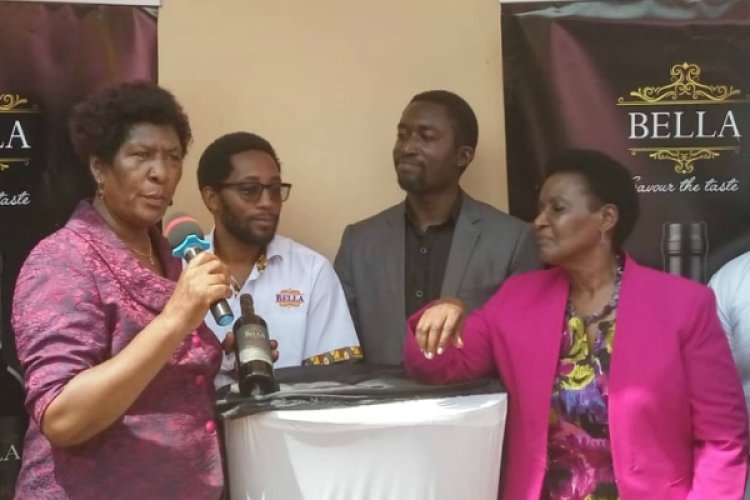One Trade Africa is Empowering African Businesses, maximizing the benefits of African regional integration for small businesses, women and youth entrepreneurs
Prudence Ukkonika, an exporter and proprietor of Bella Wine calls upon all regional players to collaborate and noted that EAC member states tend to be hard on each other yet they go easy on countries outside the community, something he described as an irony.

Prudence Ukkonika, an exporter and proprietor of Bella Wine calls upon all regional players to collaborate and noted that EAC member states tend to be hard on each other yet they go easy on countries outside the community, something he described as an irony.
She is of the view that accessing Burundi or Rwanda market is no mean feat, calling for government support if local producers are to make it in the regional market such as Rwanda where she said her products are loved.
Challenges experienced by exporters have led to interventions.
The African continent is creating the largest free trade area in the world. Once in full operation the African Continental Free Trade Area ( AfCFTA) will connect 1.3 billion people across 55 African countries with a combined gross domestic product of $3.4 trillion.
Implementation of the Agreement comes as African countries are grappling with the triple-C crisis of Covid-19, climate change and conflict. This provides African countries with an occasion to reconfigure and diversify their production and trade and prioritise the development of robust and resilient intra-African supply chains.
Although the AfCFTA has been operational since 2021, most African businesses are neither informed nor empowered to access market opportunities. Micro, small and medium-sized enterprises (MSMEs), especially led by women and youth, need access to information, resources, skills, assets, credit and economic opportunities.
“One Trade Africa”, ITC’s corporate programme launched in 2021 sets out to empower and enable African MSMEs, as well as young and women entrepreneurs to access meaningful business opportunities created by the AfCFTA.
ONE TRADE AFRCA is designed to support Africa to advance on ONE coherent framework that encompasses not only the AfCFTA, but also the REC Free Trade Area Agreements, the building blocs of the AfCFTA, and trade arrangements between Africa and the rest of the world. This is to ensure convergence with a unified goal of boosting the competitiveness of African MSMEs and their participation in both intra-and extra- African trade.
He achievements of One Trade Africa centres around Africa’s private sector, because it is the key driver for the success of free Trade Area. ITC particularly supports small businesses, young entrepreneurs and women, especially those operating in the informal sector.
One Trade Africa is designed and implemented in close coordination with the African Union Commission, AfCFTA Secretariat, African Business Council, RECs, African policy makers, and national and regional business support organizations and women and youth business groups.
The programme also benefits from partnerships with the African Union Development Agency, African Organization for Standardization, African Export Import Bank, African Development Bank, International Islamic Trade Finance Cooperation and CUTS, and United Nations Agencies including the UN Economic Commission for Africa, United Nations Development Programme and UN Women.
One Trade Africa is financially supported by the Government of Finland and Afreximbank.
The five-year One Trade Africa programme will be executed gradually, with customized interventions for each African country and the regional community as a whole.
It seeks to ensure the AfCFTA supports the following UN Sustainable Development Goals and is aligned to the African Union Agenda 2063 to create the Africa We Want.
The Sustainable Development Goals include; 1- No Poverty, 2-Zero Hunger, 5-Gender Equality, 8-Decent Work and Economic Growth, 9- Industry, Innovation and Infrastructure, 10-Reduced Inequalities, 12- Responsible Consumption and Production, 13- Climate Action and 17- Partnerships for The Goals. Facts and Figures One Trade Africa.
41 counties from 8 RECS ratified the Agreement.
67% of intra-African trade is within regional economic communities (RECS).
Intra-African trade is only 145 dues to high tariff and non-tariff trade costs.
Tariffs with African countries is at 11.8% while tariffs with non-African partners is at 6.3%.
63% of exporters are affected by trade obstacles related to NTMS.
ITC analysis shows that the AfCFTA represents a pivotal opportunity to change this.
$22 billion is the intra-African export potential while there are 94 promising value chains.
ONE TRADE AFRICA: three-pronged delivery to compete, connect, change
1. ENTERPRISE level: MSMEs, women and youth entrepreneurs can identify and access AfCFTA opportunities.
2. BUSINESS ECOSYSTEM level: actors in the business ecosystem e.g.; business support organizations) can deliver relevant, tailored services to MSME.
3. PPOLICYMAKING level: National, regional, and continental policymakers and regulators receive on-demand, technical support to set respective rules under which MSMES can thrive.
Adapting ITC tools for an integrated African Market.
The One Trade Africa programme is a critical initiative of the ITC Strategic Plan 2022-2025, broadening opportunities for African small businesses and tailoring ITC tools and services to the African continent including through supporting businesses to incorporate Green and Digital tools.
1. Improved MSME firm-level capacities to trade. SME Trade Academy: “How to Export with AfCFTA” Quality Champions and Quality Hubs, MSME Finance Gateways, GreenToCompete Hubs.
2. A more supportive business ecosystem for MSMEs: EcomConnect, She\trades AfCFTA, Lean Digital Transformation, Ye! Community Platform.
3. A more conducive policy and regulatory environment for MSMEs: Assistance to negotiate African trade agreements, National Trade and Investment Strategies, Public Private Dialogues on the AfCFTA, Regional and Continental Value Chain Roadmaps.
4. Improved business, trade and market intelligence: Africa Trade observatory and REC Competitiveness Observatories, Mapping Tools: Trade, Market, Access and Standards, SheTrades Outlook, SME Competitiveness Outlook and surveys.
Small businesses form the backbone of Africa’s economy. 33 of 55 African countries are LDCs. 90% of African businesses are SMES of which 60% operate in the informal sector.
Women own a third of all registered SMEs.
60% of the African population is below the age of 25.

































































































